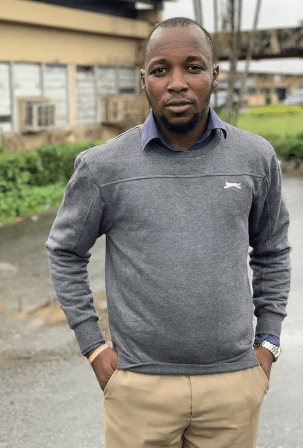In this exclusive interview with Pharmanews, Lucky Isioma Nwabueze, a 500-Level Pharmacy Student and 44th president, Pharmaceutical Association of Nigeria Students (PANS), University of Benin, Benin City, Edo State, speaks on the high points of his administration. He also bares his mind on the recent mass failure in schools of pharmacy in the country, as well as the COVID-19 pandemic. Excerpts:
Has Pharmacy always been your dream course?
I had always had the dream of becoming a doctor right from childhood, although I wasn’t even sure of what type of doctor I would love to be since I couldn’t withstand the sight of blood. So strong was my determination that I was willing to spend extra time at home as I wasn’t very lucky with JAMB and my mantra was “doctor or nothing”.

During my JAMB years, I never knew there was a degree called Doctor of Pharmacy. However, after spending almost five years at home, I was exposed to the wonderful idea of Pharmacy by my elder brother, and immediately, I developed the ambition of becoming a pharmacist. Eventually, I was admitted in 2015 to study Pharmacy at the University of Benin.
Getting to learn about the Pharm.D programme offer in my preferred institution and also learning that the Pharm.D degree qualifies me to be a doctor without having to bear the gruesome sight of blood, was another level of excitement for me. It came to me as a fulfilment of my dream and I couldn’t be grateful enough for the privilege.
So, looking back at my childhood aspirations I can boldly say that God wanted me to be a doctor, but it took me almost five years to realise that I would be a doctor of pharmacy and not the physician I thought it would be. Studying Pharmacy at the University of Benin, to me, is a dream come true and I can’t wish for any other profession.
What were your motivations for contesting for the post of PANS president?
I got into pharmacy school at a time when the faculty was a major player in the political sphere of the Students Union Government. The faculty had a female presidential candidate and she happened to be the second female contender of all time in the union. I saw her campaign as a fight for the profession, and I could remember leading the campaign for Pharm. (Dr) Lauretta Obakpolor from the junior class. I participated in her campaign and was extremely excited when she emerged victorious in that election.
My exposure to politics then developed a very strong interest in politics in me and also played a major role in motivating me. This interest and motivation saw me representing my faculty in various ad-hoc committees, running for the position of public relations officer in my faculty, and eventually running for the presidency in a keenly contested election. I strongly believe that the essence of leadership in PANS is to focus on the total welfare of all the PANSITES; hence, my campaign mantra was “shifting focus from PANS to the PANSITES”.
What aspects of your responsibilities as president do you consider particularly challenging, and what have been your achievements so far?
Leadership, in general, is challenging and hence anyone ready to occupy a leadership position should be ready for the challenges and criticisms that come with the office. In attempting to shift focus from PANS to the PANSITES, I have come to realise that the totality of the welfare of the students should be my utmost concern. I have the responsibility of ensuring that the voices of my colleagues are heard in the right quarters; as well providing them with the basic comforts and amenities that will contribute favourably to their wellbeing.
Getting to acquire these amenities is really capital intensive, and as an association that is dependent largely on external support from patrons within and outside the state, the current economic situation of the country as a result of the current global pandemic is really a big challenge in achieving these goals. My executives and I are ensuring that we are not deterred by these challenges as we are looking for alternative ways to impact our colleagues through other online media.
The present Faculty of Pharmacy, UNIBEN, commenced operation in 1970 to cater for the then mid-west states in Nigeria. Over the years, what would you say are the challenges facing pharmacy education in the school, and how can they be surmounted?
Faculty of Pharmacy, University of Benin will be celebrating her golden jubilee this year and this is a major milestone for both the staff and students of the faculty. The faculty has contributed immensely in shaping the scope of pharmacy education in the country. But from my perspective, one major challenge facing pharmacy education is the scope of the pharmacy education curriculum.
I believe that the curriculum should be remodelled to meet the current global needs and trends. I believe it should be modelled to involve more leadership and practical skills training, digital and clinical skill exposure. It should also create more room to enhance collaboration among students within and outside Nigeria.
UNIBEN is the only pharmacy school in Nigeria accredited to award the Pharm.D degree, which spans a period of six years. What do you think gave the school an edge over others, especially those that started offering Pharmacy earlier in the country?
In my view, I believe that the Faculty of Pharmacy, UNIBEN, has been blessed with very innovative lecturers, who are ready to change the status quo of pharmacy practice in the country, irrespective of the obvious challenges that they were faced with. The decision by the faculty board to be oriented towards a more global standard is what has given the faculty an edge over her contemporaries.
The founding fathers of the Pharm.D degree program had seen and were opportune to be trained in climes where pharmacy practice is more clinical and pharmaceutical-care based. This exposure, I believe, ignited the zeal to effect a change. So, from my perspective, I would say that the edge the faculty had, was based on the willingness and zeal by the faculty board to effect a change to the status quo of the practice.
If you have the honour of changing some things about pharmacy education in Nigeria, what will they be?
If I have the honour of changing anything in pharmacy education, it will be the pharmacy curriculum. The training and the courses should be geared towards proffering answers to 21st-century problems. Any part which is not currently relevant in practice will be removed. I believe this will reduce the extremely bulky nature of pharmacy education and focus more on relevant parts of the practice, thereby grooming young pharmacists with adequate problem-solving skills.
Using the school of pharmacy, UNIBEN as a case study, what do you think is responsible for the challenge of ‘mass failure’ among pharmacy students nowadays?
The issue of mass failure is a serious one that any pharmacy student can relate with. Basically, I believe that one major contributing factor to this issue is the psychological state of the student. From my experience, I have come to realise that majority of pharmacy students already have the premonition that pharmacy is very difficult and examination success is always not guaranteed no matter how hard you prepare.
With this mindset, students eventually spend a long time studying, with very little confidence required to write well in an exam. Students end up getting tense before and during examinations, which is always counterproductive.
I also believe that some of our lecturers contribute to this problem. Some of them try to make students see that failure is inevitable, and the slightest error can earn one a repeat. If lecturers can help the students to see that Pharmacy is not as difficult as they presume and that with adequate hard work, success is certain, students will get the adequate psychological boost to build the confidence needed to come out with flying colours in any examination.
Although there may be other contributing factors, I believe that if the psychological state of the students is well catered for, by helping them overcome emotional and psychological trauma, the issue of mass failure will be drastically reduced.
What is the level of support that PANS-UNIBEN is receiving from technical bodies like the PSN and the ACPN in Edo state?
Over the years, PANS-UNIBEN has received some level of support from technical bodies such as PSN and ACPN. This is evident in the roles they play during the students health week, public health awareness programmes, and partnering with students’ bodies during their weeks. I would love to use this medium to appreciate all technical bodies and individuals that have supported us in various ways in the past and I want to appeal for their continual support to the student arm of the profession. Long live Pharmacy!











